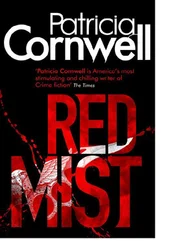“What do you mean, you know all about it ?” she again asked Lucy. “What do you know? You already knew that no one had gotten into my BlackBerry?”
“Hold on. I’m going to try something.” Lucy got on her own BlackBerry and dialed a number she was looking at on her MacBook. She listened for a long moment before ending the call and saying, “It just rang and rang. Bet you it’s a disposable phone, explaining why so many different people have had that same number and why voicemail hasn’t been set up.” She was looking at Agee’s cell phone again. “I did some checking,” she then said. “When you e-mailed me and I told you I wanted to nuke your BlackBerry and you said no, I checked right then and saw that new messages, e-mails, voicemails hadn’t been accessed. That’s one reason I didn’t just go on and nuke it anyway, regardless of your instructions. Why did you disable the password?”
“How long have you known?”
“Not until you told me you’d lost your phone.”
“I didn’t lose it.”
Lucy was having a hard time looking her in the eye. Not because she was feeling remorse, because that wasn’t what Scarpetta sensed. Her niece was emotional. She was scared, her eyes a dark green like the deep water of a quarry, and her face was unusually defeated and spent. She looked thin, as if she hadn’t been working out as much, her trademark strength and fitness at a low ebb. In the course of the several weeks since Scarpetta had seen her last, Lucy had gone from looking fifteen to forty.
Lucy tapped keys and said, “Now I’m looking at this second number that called his phone last night.”
“The call made at ten-forty?”
“Right. Comes back as unlisted and unpublished, but the person didn’t bother blocking caller ID, which is why it’s showing up on Agee’s cell phone. Whoever this is, it’s the last person he talked to. At least that we know of. So he was still alive and well at ten-forty.”
“Alive, but I doubt he was well.”
Lucy typed some more on the MacBook and was rolling through files on the Dell laptop as well, able to do about ten tasks at once. She could do almost anything except have a truthful conversation about what was really important in her life.
“He was smart enough to delete his history and empty his cache,” she said. “In case you’re interested. Won’t stop me from finding what he thought he’d gotten rid of. Carley Crispin,” she then said. “The unlisted number that called him at ten-forty. It was her. It was Carley. That’s her cell phone, an AT &T account. She called Agee, and they talked for about four minutes. Must not have been a good conversation if a couple hours later he jumped off a bridge.”
At ten-forty last night Scarpetta was still at CNN, in the makeup room, talking to Alex Bachta with the door shut. She tried to pinpoint exactly when she’d left. Maybe ten or fifteen minutes later, and she had a sinking feeling that what she’d feared was true. Carley had been eavesdropping and had heard enough to realize what lay ahead. Scarpetta was going to take her place as a talk show host, or that was what Carley would have assumed, at any rate, because it would never occur to her that someone might say no to the sort of offer Alex had made. Carley was going to be let go, and she must have been devastated. Even if she’d hovered outside the door long enough to overhear Scarpetta resisting the notion and voicing why she thought it was a bad idea, Carley had to accept an inevitability she’d fought like hell to prevent: At the age of sixty-one, she was going to have to look for another job, and the odds were almost impossible that she’d find one with a network as well respected and powerful as CNN. In this economy and at her age, she might find nothing.
“Then what?” Scarpetta asked, after describing to Lucy what had happened last night after Carley’s show. “Did she step away from the door, perhaps return to her dressing room and make a quick call to Warner? What did she say to him?”
“Maybe that his services were no longer going to be needed,” Lucy said. “She loses her show, what would she need him for anymore? If she’s not on the air, he wasn’t going to be, either.”
“Since when do talk-show hosts provide long-term hotel rooms for guests.” Scarpetta got around to that. “Especially these days, when everybody is cutting back.”
“I don’t know.”
“I sincerely doubt CNN was reimbursing her. Does she have money? This hotel for two months would cost a fortune, no matter how reasonable a rate they gave her. Why would she spend that kind of money? Why not put him somewhere else, rent him something infinitely less expensive?”
“Don’t know.”
“Maybe it had to do with the location,” Scarpetta considered. “Maybe someone else was involved and funding this. Or him. Someone we know nothing about.”
Lucy didn’t seem to be listening.
“And if she called at ten-forty to tell Warner he was fired and about to get evicted, then why would she go to the trouble to drop off my BlackBerry?” Scarpetta continued thinking out loud. “Why not just tell him to pack his things and leave the hotel the next day? If she planned to kick him out, why would she bring him my phone? Why would he feel obliged to help her with anything further if she was about to cut him off? Possible Agee was supposed to give my BlackBerry to someone else?”
Lucy didn’t answer.
“Why is my BlackBerry so important?”
It was as if Lucy didn’t hear a word Scarpetta said.
“Except that it’s a conduit to me. To everything about me. To everything about all of us, really,” she answered her own question.
Lucy was silent. She wasn’t eager to talk further about the stolen BlackBerry, because she didn’t want to talk about why she’d bought it to begin with.
“It even knows where I am because of the GPS receiver you put in it,” Scarpetta added. “As long as I had it with me, of course. Although I don’t think you were particularly worried about where I’ve been or might be.”
Scarpetta started going through computer printouts on the coffee table, what looked like hundreds of Internet searches for news stories, editorials, references, blogs pertaining to the Hannah Starr case. But it was difficult to concentrate, the most important question a barrier as solid as a concrete wall.
“You don’t want to discuss it or own up to what you’ve done,” said Scarpetta.
“Discuss what?” Not looking up.
“Well, we’re going to discuss it.” As Scarpetta skimmed more news stories that Agee had printed, research he no doubt had been doing for Carley. “You give me a gift I didn’t ask for or frankly want, this extremely sophisticated smartphone, and suddenly my entire existence is on some network you created and I’m held hostage by a password. And then you forget to check on me? If you were really so intent on making my life better-making Marino’s, Benton ’s, and Jaime’s lives better-why wouldn’t you do what any respectable system administrator would do? And check on your users to make sure their passwords are enabled, that the integrity of data is what it ought to be, that there are no breaches in security and no problems?”
“I didn’t think you liked it when I checked on you.” Lucy rapidly tapped keys on the Dell laptop, going into the downloads folder.
Scarpetta picked up another stack of papers and said, “How does Jaime feel about it when you check on her?”
“This past September he signed an agreement with a D.C. real-estate agency,” Lucy said.
“Does Jaime know about the WAAS-enabled GPS receiver?”
“It appears he put his house on the market and moved out of it. It’s listed as unfurnished.” Lucy went back to her MacBook and typed something else. “Let’s just see if it ever sold.”
Читать дальше












